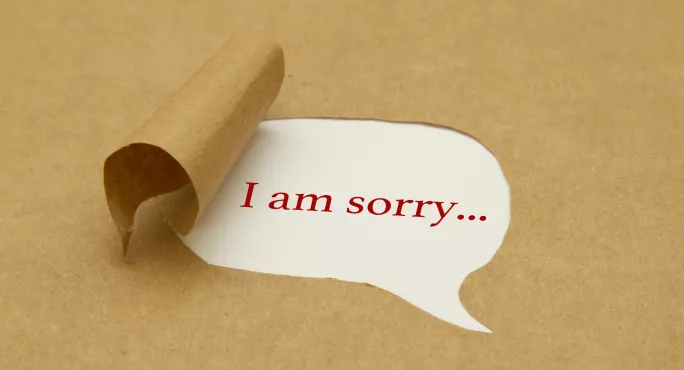- Home
- Why do we insist on making our pupils say ‘sorry’?
Why do we insist on making our pupils say ‘sorry’?

“Sorry” is a funny little word. Only two syllables, but a powerhouse nonetheless. Within it is the clout to end an argument, to calm an irate neighbour, to excuse the shouldering-in at the checkout.
Sorry is what you say when you don’t know what to say, when heartbreak or tragedy visits those close to you and you are powerless to help. Sorry is for when you have caused hurt that you cannot take back. It is the go-to of sleekit Lotharios and speeding drivers alike, palms outstretched and voice beseeching when faced with an enraged spouse or blue flashing lights.
Yet, the so-called “magic word” is not imbued with magic. It may have myriad uses, but it is still just a word. It cannot make what you did vanish from the minds and hearts of others.
Behaviour management: The importance of apologising
The art of apologising: Saying sorry properly requires taking responsibility
The S word: Do we apologise when it matters?
So why do we insist on hearing it from children? It is standard protocol that, following the latest playground atrocity, the offending child will be made to say sorry to those affected. The stern adult voice will boom, “Have you got something to say?” Maybe she does and maybe she doesn’t, but all too often the adult in charge has already decided what they want to hear from the angry offender.
The question is often asked with an impatient foot-tap or two, to make it quite clear to the child what is required. Say the magic word. Put it right. Get out of there to fight another day.
And all too often, that’s exactly what happens. Children learn quickly you can do the crime, trot out the right line and skip off into the sunset. Saying sorry doesn’t mean you feel sorry. And hearing someone say sorry doesn’t make it all better. It is just a word. Said without intent, it is entirely meaningless, providing neither the closure the wounded party needs nor any acceptance of responsibility by the perpetrator.
A reboot that fails to fix
Pretending that “sorry” is some sort of verbal control-alt-delete, retuning a relationship back to its factory settings, is plainly ludicrous. But this is the message we are sending to our pupils when we enforce an act of apology.
The next time you are confronted with a sobbing victim and a bristling culprit, ask “have you got something to say?” and then wait to see what happens. Do it minus the foot tap and do not waste your energy prising a sorry from unwilling lips - because all you will earn is resentment.
Instead, just wait and see what happens. Your repeat offender might just surprise you. Denied the easy option of a casual one-word fix, he or she might just fill the silence with something much more worthwhile: why they did it; how they were feeling, then and now; what would be a better plan in the future; what they might need from you to help that plan work.
Now, these are words that really mean something, born from reflection, given wings by a desperate desire to share the why or the how - or the “please help me” that is pulsing through the veins of a young person in crisis.
You can choose to listen and respond to these words and, in so doing, build a bridge that a child can tentatively cross. You can provide a way to escape some of the chaos, recrimination and freefalling emotions, standing close by as the child forges a new, happier route.
Sorry, then - maybe words do have some magic after all.
Susan Ward is depute headteacher at Kingsland Primary School, Peebles, in the Scottish Borders. She tweets @susanward30
Register with Tes and you can read two free articles every month plus you'll have access to our range of award-winning newsletters.
Keep reading with our special offer!
You’ve reached your limit of free articles this month.
- Unlimited access to all Tes magazine content
- Save your favourite articles and gift them to your colleagues
- Exclusive subscriber-only stories
- Over 200,000 archived articles
- Unlimited access to all Tes magazine content
- Save your favourite articles and gift them to your colleagues
- Exclusive subscriber-only stories
- Over 200,000 archived articles



